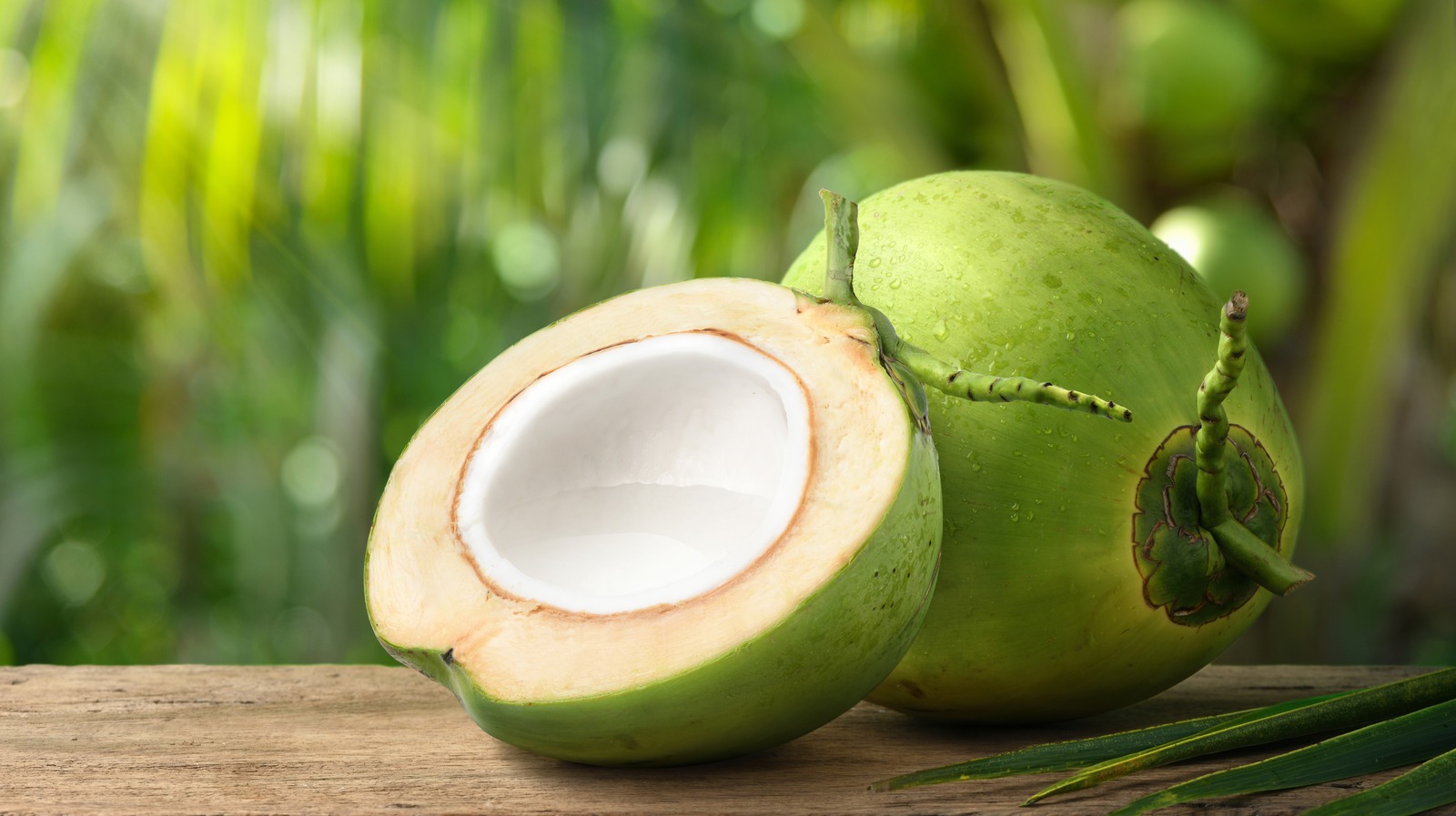
Coconut is a versatile and fascinating fruit that has been a staple in many cultures for centuries. From its refreshing water to its nutritious flesh and valuable oil, coconuts offer a wide range of benefits and uses. Whether you enjoy the taste of coconut in your dishes, use coconut oil for cooking or skincare, or simply love the tropical vibes associated with this fruit, there’s no denying that coconuts have a special place in the world of food. In this article, we will delve into 14 interesting facts about coconuts that will not only expand your knowledge but also provide you with a deeper appreciation for this amazing fruit. So, let’s crack open the shell and discover the many wonders of coconut!
Key Takeaways:
- Coconuts are not nuts! They are actually drupes, a type of fruit with a hard shell and a fleshy outer layer. So next time you enjoy coconut, remember it’s more than just a nut!
- Coconuts are like the Swiss Army knife of the plant world. From water to oil to shells, they provide food, drinks, crafts, and even natural medicine. It’s like nature’s all-in-one package!
Coconuts are technically not nuts.
Contrary to their name, coconuts are not botanical nuts. They are actually classified as drupes, a type of fruit with a hard shell containing a seed surrounded by a fleshy outer layer.
Coconut trees are known as the “tree of life.”
In many tropical regions, the coconut tree is considered a lifeline because it can provide almost everything a person needs to survive, including food, water, shelter, and even materials for making tools and crafts.
Coconuts can float in water for long distances.
The unique composition of coconuts allows them to float on water for weeks, enabling them to spread to new locations and even reach distant shores.
Coconut water is a natural electrolyte-rich drink.
Coconut water is not only refreshing, but it is also packed with electrolytes such as potassium, magnesium, and sodium. It has been used as a natural alternative to sports drinks for hydration.
Coconut oil is highly versatile.
Coconut oil is not just for cooking! It has a wide range of uses, including skincare, haircare, and even as a natural lubricant.
Coconut milk is a dairy-free alternative.
For those with lactose intolerance or following a vegan diet, coconut milk serves as an excellent alternative to dairy milk in various recipes.
Coconuts have natural antibacterial properties.
The lauric acid found in coconuts has antimicrobial properties, making it effective against harmful bacteria, viruses, and fungi.
Coconut shells make great sustainable handicrafts.
Coconut shells are often carved and shaped into various handicrafts, such as bowls, utensils, and decorative items, providing sustainable alternatives to plastic and other non-biodegradable materials.
The fiber from coconut husks is used for making ropes and mats.
The strong and durable fibers found in coconut husks are commonly used for making ropes, mats, and other woven products due to their resilience and natural resistance to rotting.
Coconuts have been used in traditional medicine for centuries.
In many cultures, different parts of the coconut, including the oil, water, and meat, have been used for their medicinal properties to treat various ailments and improve overall health.
The coconut palm is the national tree of the Maldives.
Coconut trees hold great cultural significance in the Maldives, where they are not just a source of food and income but are considered sacred and are used in various traditional ceremonies.
Coconuts can be used as natural charcoal.
When the outer husk of the coconut is burned, it transforms into a quality charcoal that is eco-friendly and free of harmful chemicals, making it ideal for grilling and cooking.
Coconuts take a year to fully mature.
From the time a coconut flower blossoms, it takes approximately a year for the fruit to fully mature and be ready for consumption.
Coconuts have religious and symbolic significance.
In many cultures, coconuts are associated with purity, fertility, and abundance. They are often used in religious rituals, weddings, and celebrations to symbolize prosperity and good fortune.
Now that you know these fascinating 14 facts about coconuts, you can appreciate them even more whenever you sip on a refreshing coconut drink or enjoy the tropical flavors of coconut-infused dishes. So go ahead and embrace the wonders of the magnificent coconut!
Conclusion
Coconut is a versatile and fascinating fruit that offers a wide range of health benefits and culinary uses. From its rich nutritional content to its hydrating properties, coconut has become a popular ingredient in various cuisines around the world.
Whether you’re enjoying coconut water on a hot summer day, using coconut oil for cooking, or indulging in coconut desserts, you can appreciate the unique taste and benefits this tropical fruit provides.
With its abundance of antioxidants, healthy fats, and vitamins, coconut is not only delicious but also beneficial for your overall well-being. So go ahead and incorporate coconut into your diet for a healthy and flavorful addition to your meals.
FAQs
Q: Is coconut considered a nut?
A: Despite its name, coconut is not technically a nut. It is classified as a fruit, specifically a drupe, which is a fruit with a hard, stone-like seed surrounded by a fleshy outer layer.
Q: Can coconut help with weight loss?
A: While coconut is high in calories and saturated fats, it can still be part of a balanced diet. Moderation is key, and the medium-chain triglycerides (MCTs) found in coconut oil may actually help boost metabolism and promote weight loss when consumed in moderation.
Q: Is coconut safe for individuals with nut allergies?
A: Coconut is generally considered safe for people with nut allergies. Allergies to tree nuts (such as almonds or walnuts) and peanuts are separate from coconut allergies. However, it’s always important to consult with a healthcare professional if you have specific allergy concerns.
Q: Does coconut water have any health benefits?
A: Yes, coconut water is a great source of hydration due to its high electrolyte content. It is also low in calories, fat-free, and rich in potassium, which can help regulate blood pressure and promote heart health.
Q: How long does coconut oil last?
A: Coconut oil has a long shelf life and can last up to two years when stored properly in a cool, dark place. However, like any oil, it can spoil if exposed to heat, light, or moisture.
Hungry for more coconut knowledge? Satisfy your curiosity by exploring coconut butter's nutritional profile, uncovering surprising facts about coconut cream, and delving into the health benefits of coconut flakes. Each article offers a unique perspective on this versatile fruit, providing valuable insights to help you make informed choices in the kitchen and beyond. Whether you're a coconut enthusiast or simply looking to expand your culinary horizons, these engaging reads promise to captivate and inspire. So, grab a refreshing glass of coconut water, settle in, and prepare to embark on a tantalizing journey through the world of coconuts.
Was this page helpful?
Our commitment to delivering trustworthy and engaging content is at the heart of what we do. Each fact on our site is contributed by real users like you, bringing a wealth of diverse insights and information. To ensure the highest standards of accuracy and reliability, our dedicated editors meticulously review each submission. This process guarantees that the facts we share are not only fascinating but also credible. Trust in our commitment to quality and authenticity as you explore and learn with us.


